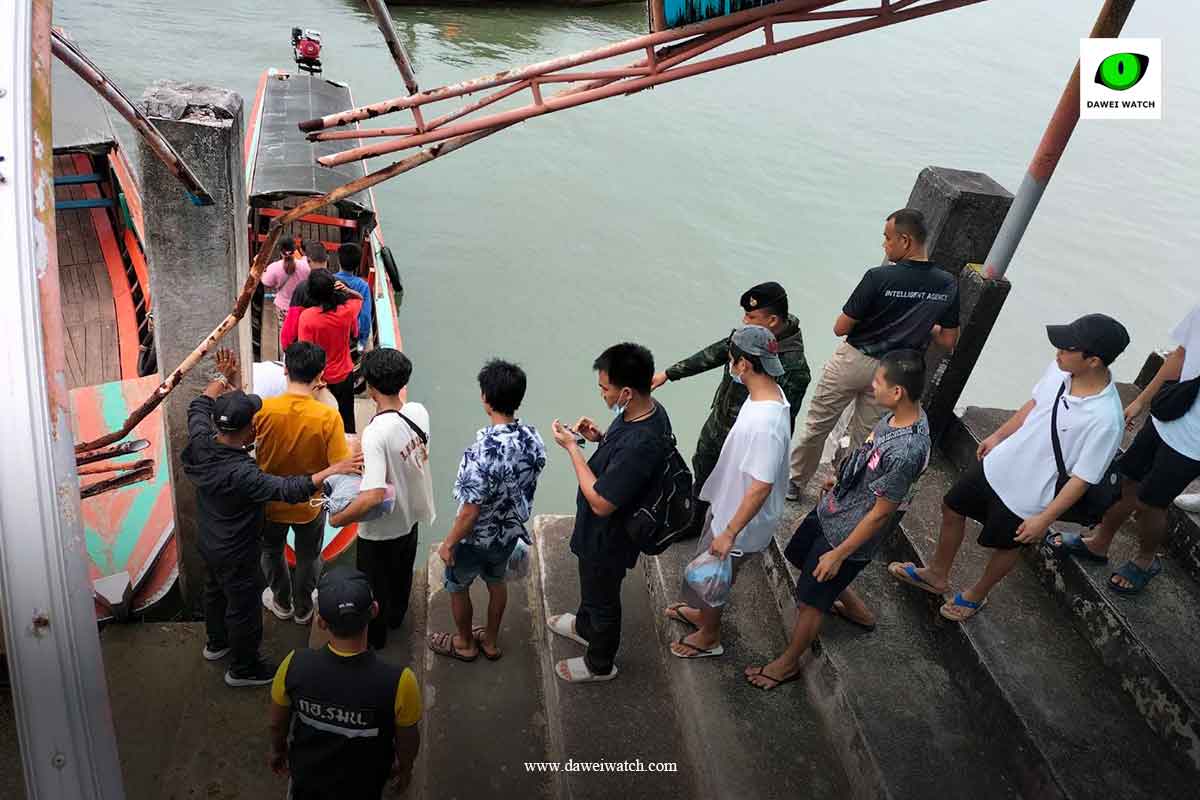After being detained in southern Thailand, Aung Myo Kyaw, a migrant worker from Myanmar, was looking forward to regaining his freedom.
It was the end of July 2024, and the 30-year-old construction worker had spent more than 20 days in the immigration detention centre in Ranong.
Aung Myo Kyaw knew he would be deported to Kawthaung, a bustling trading port at the southern tip of Myanmar, but he assumed he would be released shortly afterwards.
“The Myanmar authorities first kept us at an indoor stadium. They told us… we’d be sent home after signing some documents. Instead, they took us to Battalion No. 262 and kept us in the barracks.”
That was also what he and the roughly 120 other migrants from Myanmar – arrested for overstaying their visas – were told when they disembarked at Kawthaung after a 45-minute boat journey across the Pak Chan River.
“[The Myanmar authorities] first kept us at an indoor stadium. They told us… we’d be sent home after signing some documents,” he told The New Humanitarian and Dawei Watch, a Myanmar news outlet, after he managed to escape the military in January 2025.
“Instead, they took us to Battalion No. 262 (an infantry regiment) and kept us in the barracks. That’s when we found out we were going to be sent to the military.”
The deportees weren’t given a choice. Nobody inquired about their wishes, and there was no chance of an escape. They were also told they would be killed and their families would suffer if they tried to join the opposing side.
The young men simply became fodder for the Myanmar military, which is desperate for new recruits as it continues to suffer heavy losses against a loose coalition of forces composed of longstanding ethnic armed organisations and more recently formed opposition groups. Several armed groups fighting the junta have also been accused of forced conscription.
Alleged Thai complicity in abuses
In November 2024, the International Criminal Court issued an arrest warrant for Min Aung Hlaing, the military leader of Myanmar, accusing him of crimes against the nation’s long-persecuted Rohingya Muslim minority.
Thailand has come under criticism for seemingly aiding the junta, which has long been accused by the UN, research organisations, and civil society groups of committing widespread human rights abuses against unarmed civilians, including indiscriminate airstrikes and mass killings.
San Tun Aung, a 26-year-old metal worker who was also deported in July 2024, told Dawei Watch and The New Humanitarian that the Thai authorities knew well that the deportees would be forced to join the military.
“Before they released us, the Thai immigration officers told us, ‘Once you get back to Myanmar, you’ll have to serve in the military’,” he recalled. “[But the Myanmar authorities] told us they were taking us to get vaccinated for monkeypox. They tricked us, saying it was for disease prevention. Even when we arrived, they said we’d just need to sign some papers and then we could go home.”
Chatchai Amornlerdwattana, senior lawyer for the Peace Rights Foundation, a Thai organisation helping detained foreigners, said Thailand has enacted laws that are intended to prevent such actions.
“The law says that a person must not be repatriated if he or she could face danger or his or her life would fall into danger. In such circumstances, each case has to be scrutinised,” he said.
Matthew Smith, CEO and founder of Fortify Rights, said the forced repatriations were “not only a violation of international law but also a humanitarian and strategic mistake”.
“The Thai authorities should investigate this case and ensure its authorities enforce Thai law and protect people as required,” he told The New Humanitarian.
Despite multiple phone calls, the Tanintharyi Regional Committee for Summoning People’s Military Services in Myanmar could not be reached. The New Humanitarian also reached out to the Thai authorities for comment, but did not receive a response in time for publication.
Unknown scale of forced conscription
It is difficult to estimate how many young men experienced the same fate, but an analysis of available figures suggests the number of people affected could be in the hundreds at a minimum.
In 2024, more than 6,300 people were arrested for entering Thailand illegally, according to FE5 Tanintharyi, a research group that has been monitoring these developments in the region. All were sent back to Myanmar, and the repatriation process has been the main source for the military junta to recruit, the research group said, citing Thai news reports.
More than 2,000 Myanmar citizens were handed over to the junta through the Ranong-Kawthaung border route alone in 2024, according to the immigration department of Ranong province. This is one of three main deportation routes.
Min Oo, who handles labour issues for the Thai-based Education and Development Foundation, said he has heard numerous reports of the junta getting recruits this way.
“I hear from their relatives that young deportees who are in the right age bracket, especially men, were taken away and sent for military service,” Min Oo said. “Thailand and the international community or ASEAN community should take action… based on human rights principles.”
Forced conscription in this context “constitutes forced labour, which is prohibited under international human rights law, including ILO Convention No. 29”, said Smith from Fortify Rights. “It can also be considered a war crime under the Rome Statute of the ICC, and perpetrators can be prosecuted,” he added.
Human Rights Watch has called Thailand’s actions of repatriating people to Myanmar a violation of the United Nations Convention Against Torture (UNCAT) and demanded that the practice be stopped.
It said the expert body that reviews state compliance with UNCAT should press Thai officials on why Thailand has disregarded the domestic law that prohibits deportation where there are substantial grounds to believe the person could be in danger.
According to IOM, the UN’s migration agency, there were some 2.3 million registered Myanmar nationals working in Thailand, accounting for about 70% of the total registered migrant workforce in the country.
But the real number is likely far higher as IOM believes the majority of Myanmar workers in Thailand are undocumented. The Thai government began a process of legalising their stay in December 2024. A crackdown saw almost 200,000 Myanmar nationals arrested over just four months last year, and the military junta reportedly said 1,000 workers were repatriated in August 2024 alone.
As Myanmar enters a fifth year of military rule, opposition forces have been advancing in various parts of the country. But the civil war has also taken a heavy toll: It has killed thousands of civilians, displaced millions of people, and left nearly 20 million – more than a third of the population – in need of humanitarian assistance.
As losses mounted, the junta announced in February 2024 that it was enforcing the People’s Military Service Law, which allows citizens between 18 and 35 years of age to be conscripted. For skilled technicians, the age limit is 45. Critics say it is now stepping up efforts to shore up its ranks by resorting to kidnappings and forced recruitment.
According to a press release last month issued by the Human Rights Ministry of Myanmar’s exiled National Unity Government (NUG), the military has arrested nearly 23,000 people within the country to force them to fight for them.
“I never wanted to die for them”
But these figures do not include people like Aung Myo Kyaw or San Tun Aung, who were deported from Thailand and forced into attending basic military training for three months in Kawthaung.
Both of them had been living and working in Thailand since they were young children but were arrested in July 2024 when a surprise police check discovered their temporary residency documents had expired. San Tun Aung spent four days in jail before being locked up for a further 45 days at the immigration detention centre in Ranong.
“They promised we wouldn’t be sent to the front lines and that our families would be kept safe. But they also warned us: if we tried to escape, it would be considered desertion, and they’d arrest our families and sentence us to death.”
At the military training, the officers threatened them not to flee from the military compound.
“They told us we have to serve two years because of the conscription law and that they’d release us afterwards,” San Tun Aung said.
“They promised we wouldn’t be sent to the front lines and that our families would be kept safe. But they also warned us: if we tried to escape, it would be considered desertion, and they’d arrest our families and sentence us to death.”
The threats did not deter them, and they repeatedly thought of escape, but it was impossible, Aung Myo Kyaw said. They were under watch, living in cramped quarters, and told the compound was surrounded by mines.
After 12 weeks of training, both were assigned to an infantry regiment in Kawthaung that was involved in fierce fighting in Mon and Karen states. San Tun Aung and Aung Myo Kyaw, newly trained and without any prior combat experience, found themselves in the combat zone.
“[The military officers] tricked us into going to the field. They said an artillery unit needed support…. and we have to back them up. Once we got there, it was clear we were on the front lines,” said San Tun Aung.
However, one night while they were on watch in January 2025, they took the ultimate gamble. Taking their weapons with them, they slipped across the front line and joined the opposition.
“We didn’t like [the military junta’s] policies since we were in Thailand. We didn’t like their policies before we were imprisoned. We didn’t like them any more after the imprisonment,” said San Tun Aung. “I never wanted to die for them. If I was going to die, I’d rather die fighting against them.”
Edited by Thin Lei Win and Ali M. Latifi.
This story was produced in collaboration with The New Humanitarian. (The New Humanitarian ကို ၁၉၉၅ ခုနှစ်က ကင်ညာနိုင်ငံ ၊ နိုင်ရိုဘီမြို့တွင် စတင်တည်ထောင်ခဲ့သည်။ ရဝမ်ဒါလူမျိုးတုန်းသတ်ဖြတ်မှုကို တုံ့ပြန်သည့်အနေဖြင့် စတင်တည်ထောင်ခဲ့ခြင်းဖြစ်ပြီး UN-OCHA (ကုလသမဂ္ဂ လူသားချင်းစာနာမှုဆိုင်ရာ ညှိနှိုင်းရေးရုံး)၏ အဖွဲ့ဝင်ဖြစ်သည်။ သို့သော် သတင်းတင်ဆက်မှုအရ သီးခြားလွတ်လပ်မှုရှိသည်။ လက်ရှိတွင် ဆွစ်ဇာလန်နိုင်ငံ ဂျနီဗာမြို့(Geneva)တွင် အခြေစိုက်ထားသည်။)



